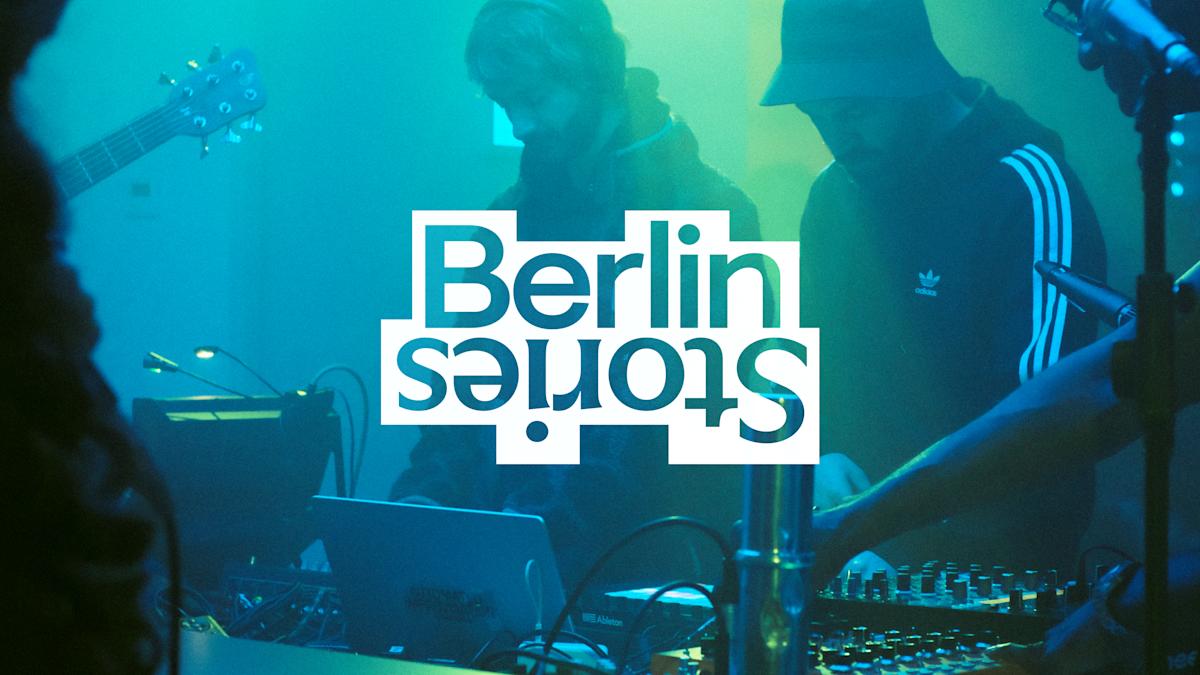
Berlin Stories
This week: Black history month, fusion soundscapes, soli kufa
Loading
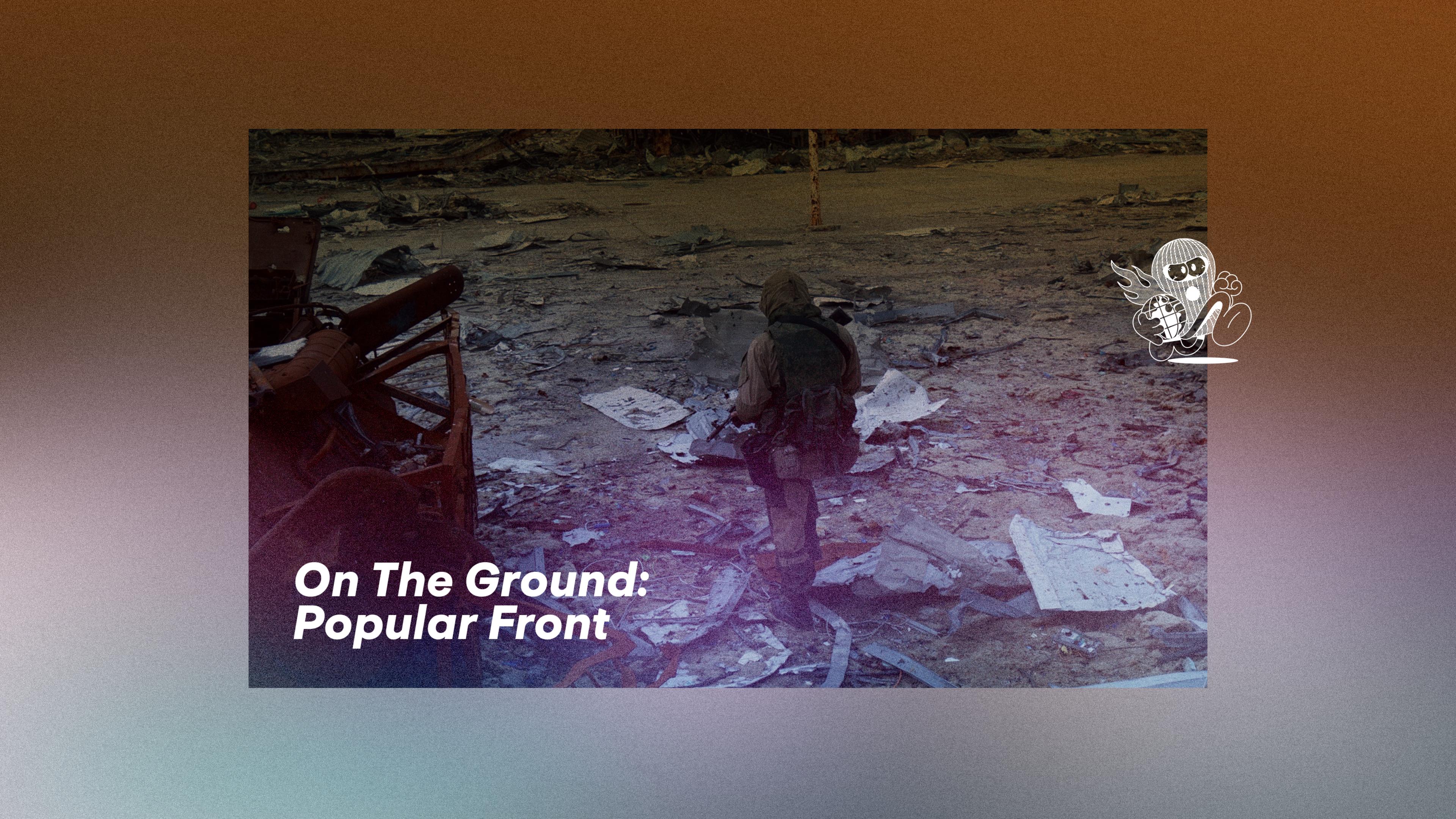
Johanna Urbancik talks to the founder of the grassroots media platform Popular Front.
By Johanna Urbancik
Jake Hanrahan has made a name for himself within and beyond the world of traditional journalism, having reported from war and crisis zones in Syria, Iraq, Ukraine, Palestine and southern Turkey, to name a few. With his media organisation, Popular Front, he shares podcasts, documentaries, and zines focusing on the aspects of war and conflict that mainstream outlets ignore. Unlike traditional news companies, Popular Front sustains itself entirely through Patreon subscriptions, merch, and independent sponsorships.
In this interview, Jake tells us about what it takes to make a Popular Front documentary, how to deal with internet “experts”, and Popular Front’s work in Ukraine and Armenia.
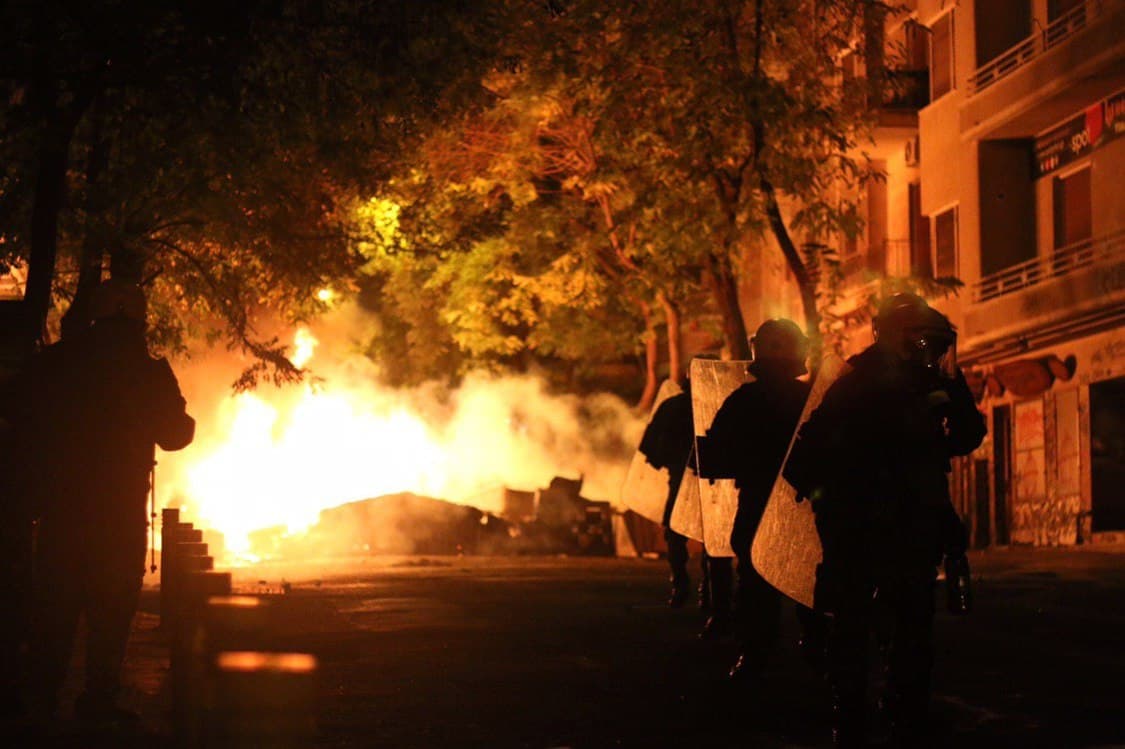
(Anarchists fight with police in Athens - Greece, 2018)
Hi Jake, why did you start Popular Front?
I felt there was a gap in conflict reporting. A certain demographic of people who were very good at what they were doing were being completely ignored by more mainstream publications. Or, if they weren't being ignored, their work was just being stolen from them.
I wanted to create a journalism outlet for people who are not the traditional war reporter type. I also wanted to establish an organisation that wasn't influenced by grants from government-linked entities or by corrupt businessmen who decide the agenda based on their own politics.
I became tired of people telling me that underreported issues were not important, even though I knew they were, and I knew people cared. The success of Popular Front proves that we were right. People do care. You just have to present it in an interesting way.
Why did you become a war reporter?
I'm interested in kinetic situations or environments that are completely different from the norm. It doesn't get much more different, confusing, and kinetic than war.
It's not so much the conflict or the combat I'm interested in. I don't care about which weapon fires which bullet. I'm interested in how war affects people when it turns a normal situation upside down. On a Monday, someone can just have a regular job doing their thing. And on a Tuesday, if war comes to their doorstep, they either have to run, fight, or do something else to help. That's why I was drawn to it – to see how war impacts people and society.
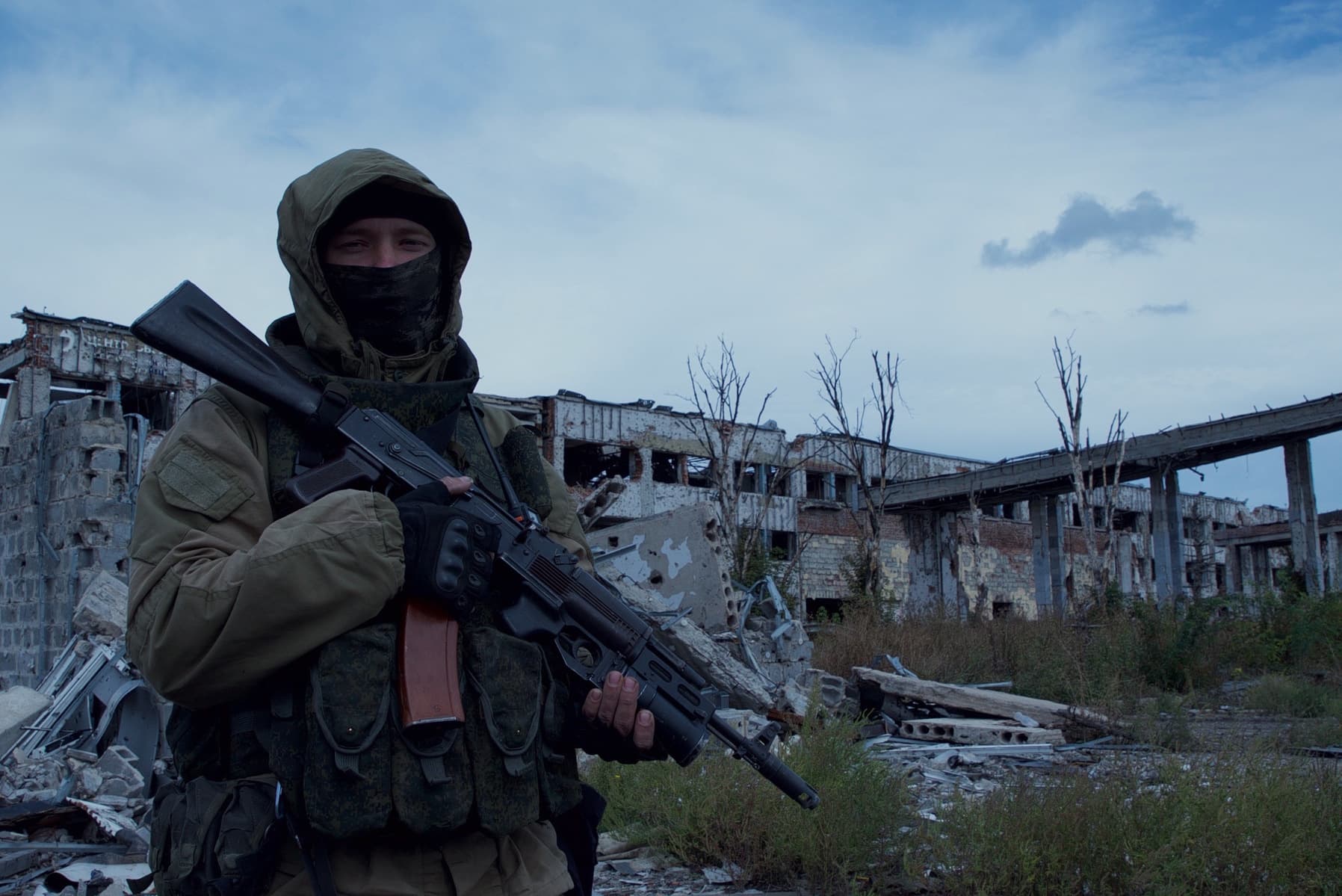
(Sergey Lim, a separatist fighter from Russia, surrounded by the destruction of Donetsk Airport - Ukraine, 2016)
How does your approach to reporting on conflicts and war differ from that of traditional or mainstream news organisations?
At Popular Front, we blend in with the people a lot more. I don't like talking about class because it's boring, but the reality is that the majority of reporters in news organisations are middle class, have a private school education, or are upper class. They are not the ones who fight in wars or are on the front lines.
It's typically working-class men and women who end up fighting. Our approach to war reporting is different, in that we report on conflicts and wars from the perspective of the people who would be sent to fight if a war came to our country.
One recent documentary focuses on Russian partisans who are either fighting in Ukraine or attempting to destabilise Russia from within. What was the response to the documentary like?
Those fighting in Ukraine were very receptive to it. I have friends on the front line in Ukraine, and they thought the documentary was excellent. The negative feedback we received was from the kind of people who are numb to brutal violence and turn it into pop culture because it's one side versus the other. Initially, they doubted that the people in the documentary were Russian, claiming that every Russian is bad, so the whole thing must be fake.
On the other hand, we also received negative feedback from pro-Russian imperialists – ironically tankies and ultra-communists who claimed that these guys were fake and working for the CIA. But this was the minority. The majority of people liked the documentary.
Unfortunately, many people had no idea that this was happening. They are not shown this side of things. For some reason, everything has to be black and white with this war. It was a challenging documentary to produce, but I felt that this is an important perspective that is not usually told.
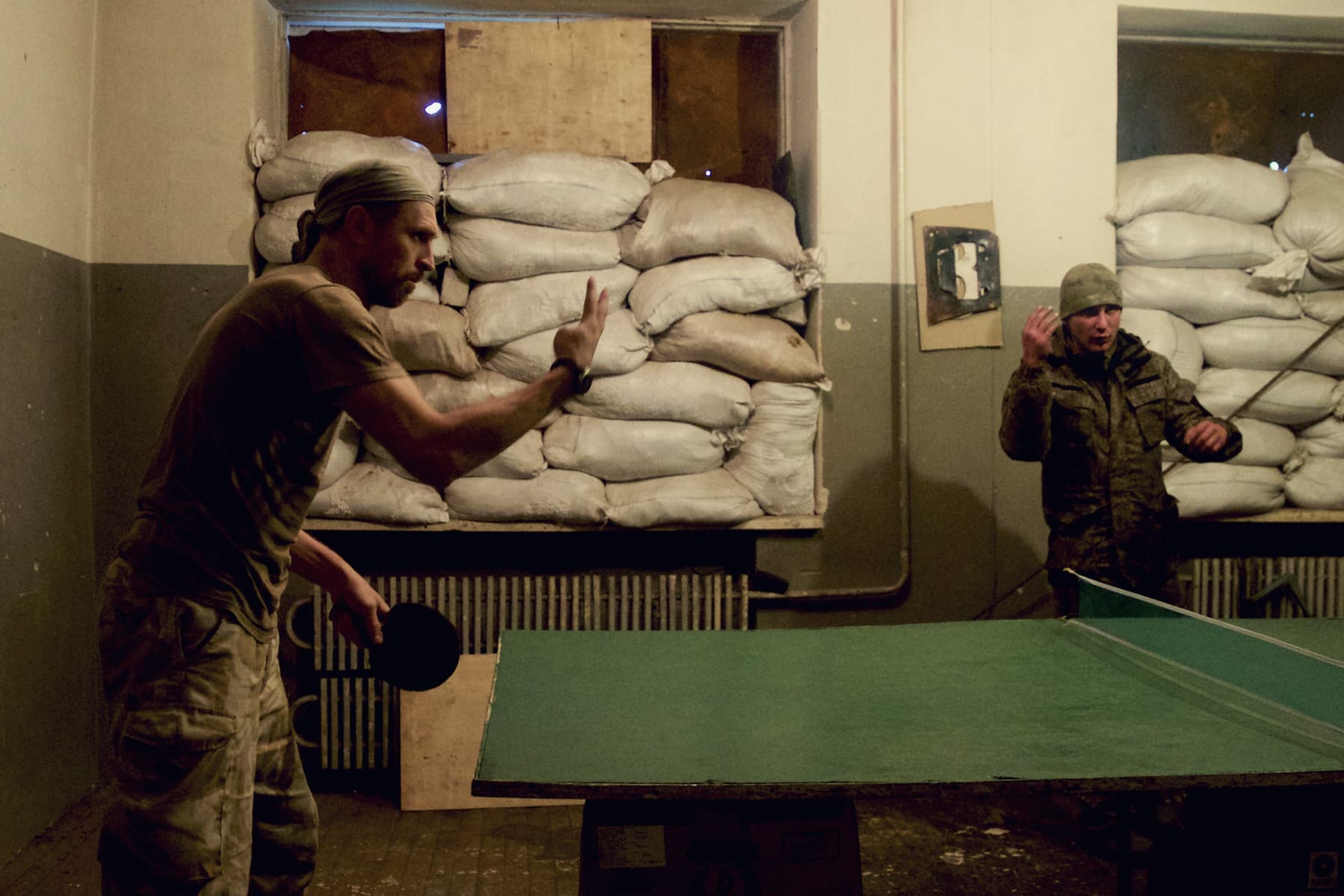
(Ukraine soldiers playing table tennis at a frontline base in Avdiivka - Ukraine, 2015)
You have reported from Ukraine before the full-scale invasion. How do you deal with the rise of "experts" on social media who can't be pleased with any type of reporting?
We ignore them because they're not relevant to us. We don't play the "look how popular we are on the internet" game. If you were to talk to people who have suffered the loss of their loved ones, the destruction of their land and homes, the bombing of their houses, and deprivation of food and livelihood on the front lines, they wouldn't care about internet experts.
We're very conscious of not buying into or playing that game. There are serious negative consequences for us because, in the role of war reporting now, you have to play the game and be part of the club. We don't do that because it's not normal or human. It's not what war is about.
Unfortunately, people with no experience in Ukraine, no experience on the front lines, will be listened to more than people with experience if they project the simplistic idea of one side is good and the other is evil.
How do you decide which topics or conflicts to cover in a documentary? We'll never be the first. We don't have the money and resources to do that. So, we focus on what's different. In Ukraine, everyone was covering the clashes, which is important frontline reporting. We noticed many militias, including fascist and ultra-nationalist militias, but then we found a militia formed by antifascist football hooligans. They happened to be the only antifascist football hooligans in the whole of Ukraine for the last 15 years. That's a unique story that sheds light on a side of this conflict that you won’t see on the news.
When we look into these specific communities that are also fighting, it gives a more diverse and accurate depiction of Ukrainian society. If we were to just rely on the mainstream news, we would think that everyone in Ukraine is fighting for the same reason. But in reality, there are many people, such as the anti-fascist hooligans who have been fighting against ultranationalists for decades, who have now changed their tactics to save their country.
We aim to find unique stories within existing conflicts or to investigate wars that are not being reported on enough. However, there has to be something special about the story to make it a Popular Front documentary. We need to make the story unique from our perspective while also ensuring that it tells a niche story in an engaging way.
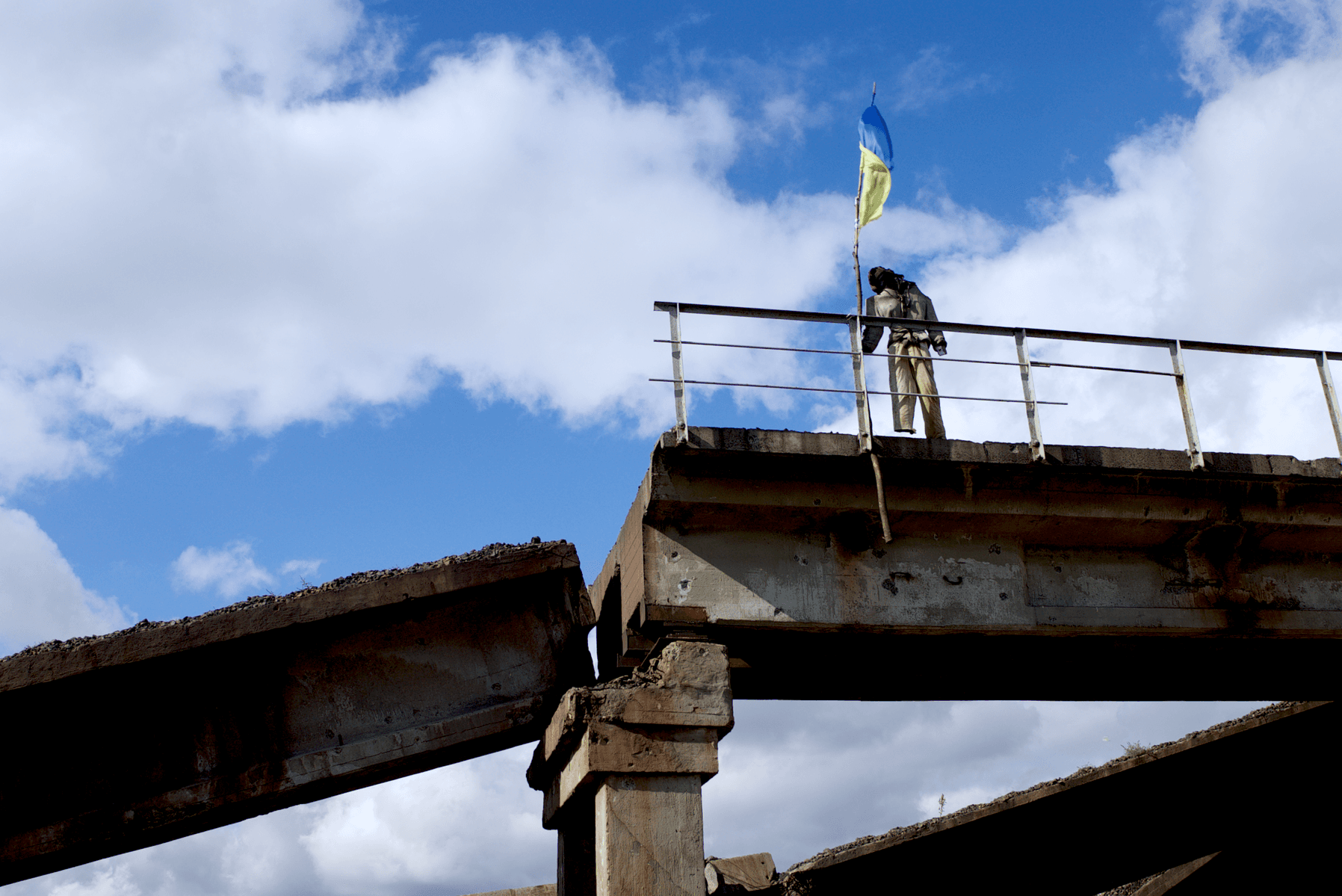
(A scarecrow on a collapsed bridge, just past the entrance of the ATO zone - Ukraine, 2016)
Are you still in contact with the group, Arsenal Kyiv Hooligans/ Hoods Hoods Klan from that documentary?
I talk to them probably every week, to be honest, especially Anton and his wife. She even came to one of our screenings in Germany all the way from Ukraine to show support and say thank you. They're a very interesting and intelligent group of people. However, they've been sidelined a bit due to their beliefs and what they did before the war.
The Kyiv Independent, which is now the biggest independent journalism platform in Ukraine, has extensively covered the war but hasn't once mentioned the leftist divisions fighting in Ukraine for their country. I think that speaks volumes. Despite being sidelined, they're still fighting for their country and what they believe in. I think it's important to keep in touch with people and raise awareness. Through various screenings across Europe, we raised a fair bit of money for them, which we donated for medical equipment because they were lacking in that regard.
Their commander, Yuriy Samoilenko, was killed last year, which was a big blow to them and their unit is all over the place, but they're still doing what they do.
How do you manage to remain a journalist and not turn into an activist when you witness the struggles of your friends, whom you are covering?
I'm not an activist and I've never felt the need to become one. The way we get our message out is by making our documentaries and doing our journalism. Making a documentary that is fair, accurate, truthful, and properly calls things out, is more important than doing neutral reporting for me. You can't be neutral in a non-neutral situation. Imagine if people were neutral about the Nazis. I believe that truthful reporting means being honest about what you think is right.
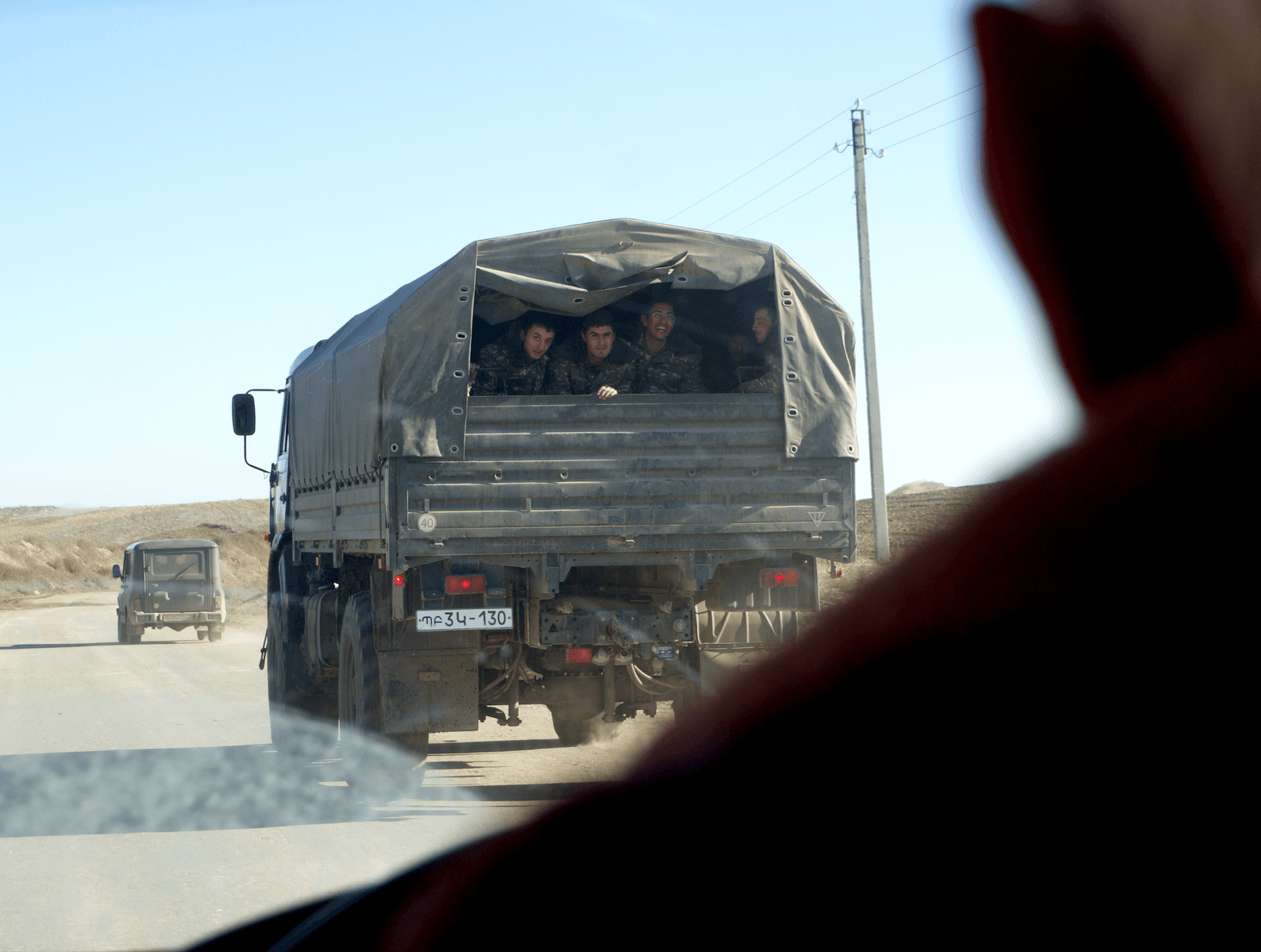
(An ageing soldier watches as young Armenian troops are transported to the frontlines - Artsakh, 2021)
Why did you decide to make a documentary about Artsakh?
I have been interested in Karabakh, or Artsakh, since 2014 and had been trying to go there. I read something about the region and wanted to see it for myself. When I was working at Vice, in 2016, the four-day war broke out, and we were meant to fly out the same day, but it was over by the time we got things set up. Then, the 2020 war happened, and even though we missed the main kinetic part of the war because we were on another project, we went straight there as soon as we were done with it. We covered the very tense ceasefire, and I believe our coverage was the best in that conflict. We put our heart and soul into it and were with Armenians on the ground the whole time.
To be honest, other reports I saw were average, saying simply that both sides have committed war crimes, which, yes, technically, it’s true. But you're talking about a few executions on one side versus dozens and dozens of government-awarded beheadings and mutilations on the others. That's not being biased against Azerbaijan; that is literally what happened. I don't understand why the rest of the media put both sides on equal blame when it comes to war crimes. Maybe they couldn't be bothered. The region is not of much significance to the media.
We really need to make a difference and show everybody how serious and bad this is. Armenia's only ally is Russia. They don't really like Russia, and Russia hasn't helped them in the recent attacks that happened. Right now, Azerbaijan is occupying actual sovereign land of Armenia, and the Russian forces, the peacekeepers, won’t help. Armenia has received no help from anyone. Moreover, Azerbaijan is the new EU ally because they sell them gas now. I actually looked into this, and Azerbaijan breaks almost every single rule of the EU charter. It's incredible that the so-called progressive West will do for money.
With the Azerbaijan – Armenia conflict, that's so visible, you know? That's why I'm so happy with our documentary. It was immediately censored by YouTube, so it has very few views. But that doesn't matter because every view counts. We laboured over it, even though we weren't meant to go to many of the places we went to. The Ministry of Foreign Affairs was quite controlling, and they told us not to go to certain frontlines. The reality is that the Armenian government had not been properly supporting their own troops. They received literally hundreds of millions from the diaspora, yet some troops didn't even have winter boots.
That's really the essence of Popular Front. We were there for the people and showed the reality of the people and their desolate situations. We showed the hypocrisy of the EU and the corruption of the government. I'm glad we did it. It was very important for us.
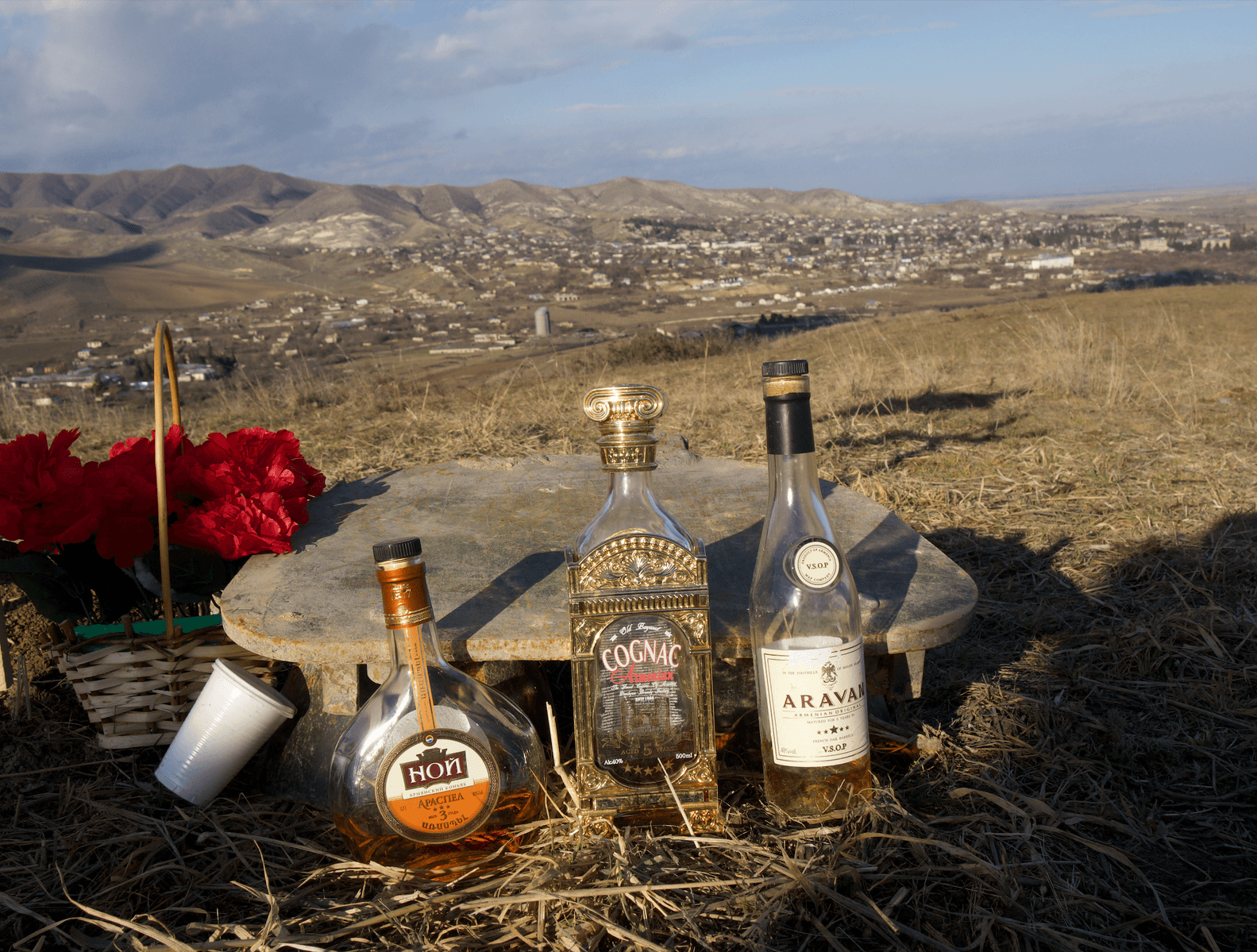
(Cognac left out in commemoration for a fallen Armenian soldier, buried here on the frontline - Artsakh, 2021)
Watch the latest Popular Front documentary, covering the ongoing riots in France, here.
Check out Popular Front’s latest podcast episodes, documentaries, and merch releases on their official website here.
All photos courtesy of Jake Hanrahan.

This week: Black history month, fusion soundscapes, soli kufa
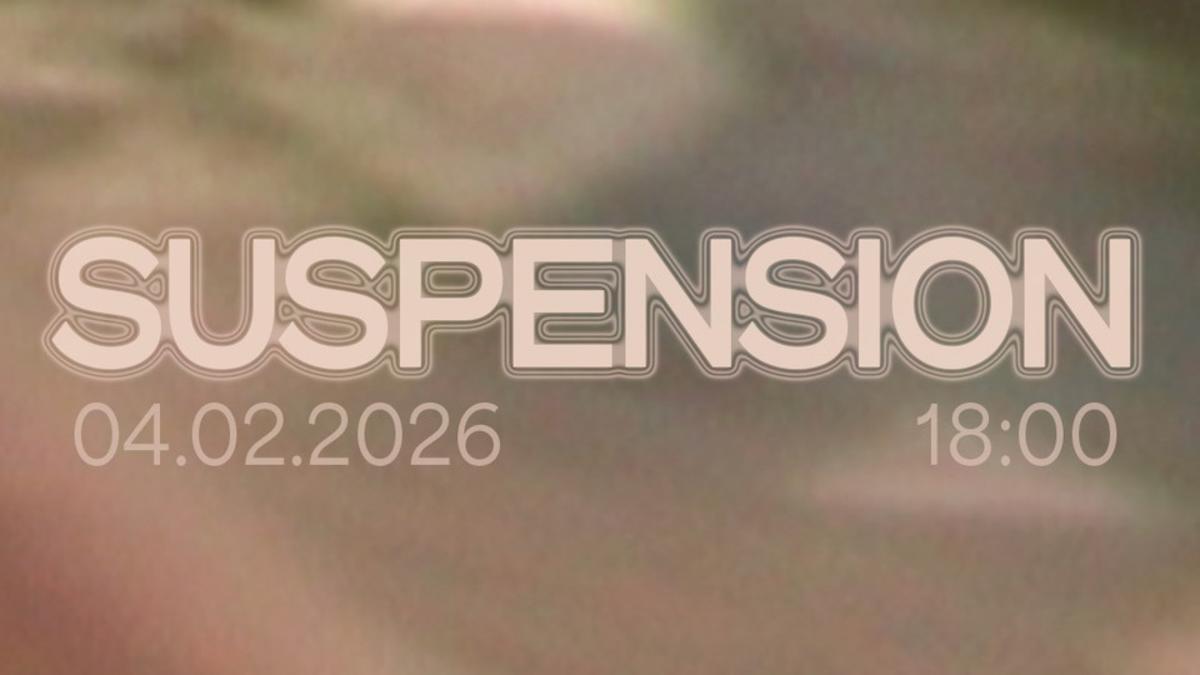
A screening, conversation, and live performance at Niemetzstraße 1.
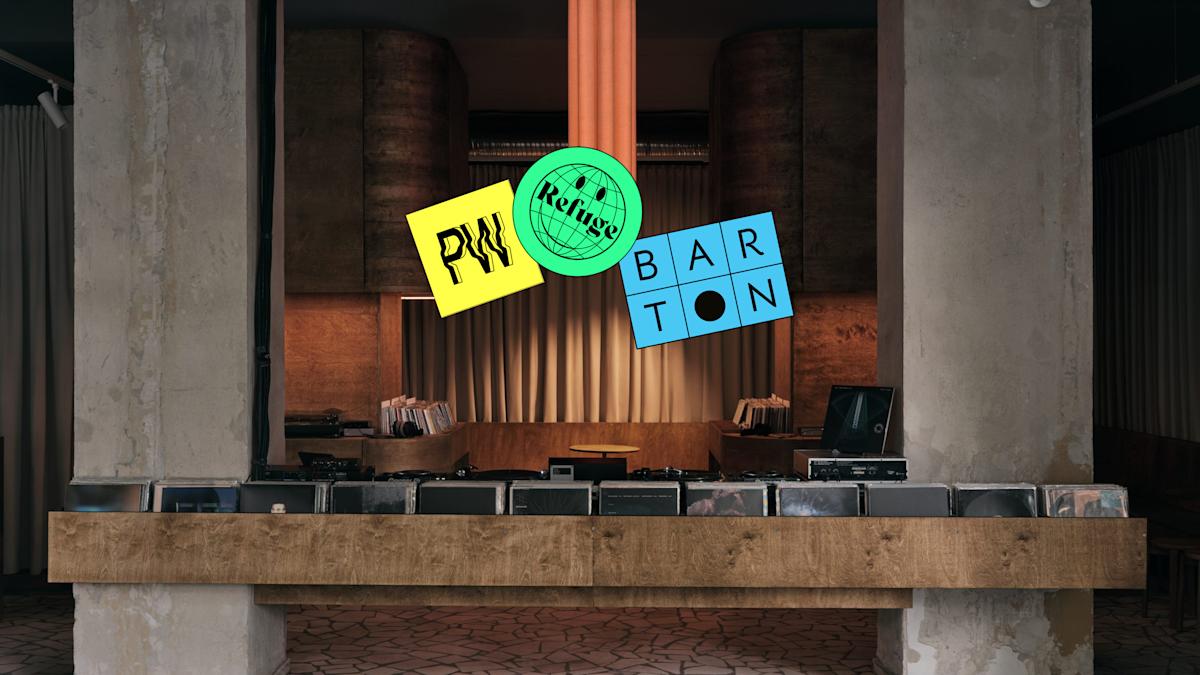
Refuge Worldwide residents head to Romania.